B Vitamins for Dissociation: Supporting Nerve Health and Energy
Introduction
When your mind drifts away from your body — when reality feels distant, flat, or foggy — it’s not just a psychological experience. Dissociation is a biological stress response, and its roots extend deep into the brain, nervous system, and cellular energy balance. For people who live with chronic stress, trauma, or burnout, the nervous system often becomes depleted — chemically, nutritionally, and electrically.
That’s why understanding B vitamins is so important. These nutrients are the engines of the nervous system. They power brain cells, regulate neurotransmitters, and maintain the integrity of the myelin sheath — the insulation that allows signals to travel between neurons. Without enough B vitamins, especially B1, B6, B9, and B12, the brain can’t communicate efficiently. The result can feel like mental detachment, fatigue, numbness, or “living outside your body.”
This article explores how B vitamins support nerve health, cognitive function, and emotional energy — and how replenishing them can help people with dissociation rebuild stability, presence, and vitality 🌞.
Looking for supplements for This? Click here.
Dissociation and the Nervous System: Energy on Empty ⚙️

Dissociation is often described as an “out-of-body” state, but it’s actually the body protecting itself from overwhelm. When the amygdala detects danger and the stress response is triggered, adrenaline and cortisol flood the system. If the threat is prolonged or inescapable, the brain shifts into freeze mode, lowering energy output and dulling awareness to prevent emotional overload.
This energy collapse is not just psychological — it’s metabolic. The nervous system consumes enormous amounts of energy, and when the body is chronically stressed, it burns through vitamins and minerals at a rapid rate. The B vitamins are especially vulnerable because they’re water-soluble and must be replenished daily.
Without them, neurons can’t produce enough ATP (the cell’s fuel). Neurotransmitters like serotonin, dopamine, and GABA become imbalanced, and nerve communication slows down. This biochemical fatigue can manifest as cognitive fog, derealization, or emotional flatness — all hallmarks of dissociation.
Supporting B-vitamin balance doesn’t cure dissociation directly, but it gives the nervous system the raw materials it needs to function again — to feel, connect, and respond safely to the world.
Why the Brain Loves B Vitamins 🧠
The B-vitamin family includes eight essential nutrients that work together as a biochemical orchestra. Each one supports a different aspect of brain health — from energy metabolism to neurotransmitter synthesis to myelin maintenance.
They’re like conductors and fuel sources at the same time. When they’re in balance, the brain hums with clarity and presence. When they’re depleted, the signal between body and mind weakens.
Let’s look at how specific B vitamins support the systems most affected in dissociation.
Vitamin B1 (Thiamine): Reconnecting the Brain and Body ⚡
Thiamine is the first in the B family and one of the most important for nerve signaling and mental clarity. It helps convert glucose into energy — the brain’s primary fuel — and supports the functioning of the vagus nerve, which regulates the mind-body connection.
Low thiamine can cause fatigue, brain fog, and emotional detachment. In extreme deficiency, it leads to neurological disorders like Wernicke’s encephalopathy, which features confusion and disorientation — symptoms that strikingly resemble dissociative episodes.
Stress, caffeine, alcohol, and sugar all deplete thiamine. Restoring it through supplementation or foods like sunflower seeds, lentils, and whole grains can help the nervous system “turn back on.”
In dissociation recovery, B1 acts as a switch that reconnects body awareness by supporting the parasympathetic nervous system and improving cellular energy. People often report sharper thinking, better balance, and a return of physical presence when thiamine levels normalize.
Vitamin B2 (Riboflavin): The Energy Carrier 🔋
Riboflavin plays a central role in mitochondrial function — the production of ATP inside every cell. The brain uses more energy per gram than any other organ, and riboflavin ensures that neurons have the fuel to fire consistently.
It also helps recycle other B vitamins like niacin (B3) and folate (B9), amplifying their effects on neurotransmitter balance.
For people with dissociation-related fatigue, riboflavin is like the bridge between nutrition and wakefulness. Low levels can contribute to chronic exhaustion and headaches, two symptoms common among trauma survivors.
Foods rich in riboflavin include eggs, almonds, and leafy greens. It’s often included in B-complex supplements, where it helps stabilize energy without overstimulation — a crucial factor for those who already live in a hyperactive stress state.
Looking for supplements for This? Click here.
Vitamin B3 (Niacin): Rebalancing Neurotransmitters 🌿
Niacin is essential for synthesizing NAD+ (nicotinamide adenine dinucleotide), a molecule that powers cellular metabolism and DNA repair. It also regulates serotonin and dopamine — neurotransmitters that govern emotional stability, motivation, and pleasure.
Deficiency in niacin can cause irritability, mental confusion, and even depersonalization-like symptoms. In severe cases, the condition pellagra leads to cognitive breakdown and hallucinations — dramatic evidence of how crucial this vitamin is for mental coherence.
Niacin’s role in serotonin synthesis is particularly important for people with trauma-related dissociation. When serotonin is low, emotional processing shuts down and sleep is disrupted. Restoring niacin helps bring back both balance and vitality.
Niacinamide, a gentle form of B3, has been shown to reduce anxiety and support GABA function without causing flushing (a side effect of regular niacin). Together with other Bs, it contributes to a steady, grounded energy — one that allows the nervous system to stay present instead of collapsing.
Vitamin B5 (Pantothenic Acid): Healing from Adrenal Exhaustion 🌿
Pantothenic acid is often called the “anti-stress vitamin.” It’s essential for producing coenzyme A, which helps the body metabolize fats and create cortisol — the hormone that mobilizes energy during stress.
While cortisol has a bad reputation, the goal isn’t to eliminate it — it’s to regulate it. Chronic dissociation often occurs after long periods of stress that deplete adrenal reserves. When cortisol levels crash, fatigue and emotional blunting follow.
B5 helps rebuild adrenal balance, supporting steady energy during the day and proper relaxation at night. By keeping the stress response efficient rather than overreactive, pantothenic acid helps prevent the nervous system from swinging between hyperarousal and shutdown.
Foods like avocado, mushrooms, and chicken provide natural sources, but supplementation in a balanced B-complex can be especially restorative for trauma-related fatigue.
Vitamin B6 (Pyridoxine): The Mood Regulator 💫
Vitamin B6 is one of the most critical nutrients for emotional and neurological health. It helps convert tryptophan into serotonin, tyrosine into dopamine, and glutamate into GABA — the calming neurotransmitter that helps you feel grounded.
When B6 is deficient, the brain struggles to produce these key messengers. You might feel anxious, disconnected, or emotionally numb. Some people describe it as being “awake but not alive.”
B6 also plays a role in synthesizing myelin, the insulating sheath around nerves that ensures clear communication between brain regions. Without enough B6, neurons misfire, leading to poor coordination between emotion, thought, and body awareness — a pattern common in dissociative states.
Studies show that B6 supplementation can improve mood, reduce irritability, and enhance cognitive clarity. It’s especially effective when combined with magnesium, which amplifies its calming effect on the nervous system.
Vitamin B9 (Folate): Rebuilding Emotional and Cellular Repair 🧬
Folate — or folic acid in its synthetic form — is the key to DNA synthesis, red blood cell production, and neurotransmitter formation. It’s essential for methylation, the biochemical process that activates and deactivates genes related to mood and stress resilience.
Low folate levels have been linked to depression, cognitive fog, and fatigue — all symptoms that overlap with dissociation. Folate also works hand in hand with B12 to produce S-adenosylmethionine (SAMe), a molecule critical for serotonin and dopamine balance.
In trauma recovery, folate is particularly important for neurogenesis — the growth of new neurons and synapses. A nourished brain literally builds new pathways of connection.
However, some people carry genetic variants (such as MTHFR mutations) that impair folate metabolism. In such cases, using the methylated form (L-methylfolate) ensures better absorption and effectiveness.
Foods high in folate include spinach, lentils, asparagus, and citrus fruits. For deeper healing, methylated folate supplements can offer a targeted boost for emotional and cognitive repair.
Vitamin B12 (Cobalamin): The Grounding Vitamin 💎
Of all the B vitamins, B12 has perhaps the most direct link to dissociative symptoms. It’s vital for maintaining the myelin sheath that protects nerves and allows fast, accurate communication between brain regions.
B12 deficiency can cause memory loss, confusion, dizziness, and even depersonalization — feelings of being detached from oneself. Many people who experience chronic fatigue or emotional numbness discover that low B12 was a hidden factor all along.
B12 also regulates homocysteine, an amino acid that becomes toxic at high levels and contributes to inflammation and oxidative stress in the brain. When homocysteine drops, neural inflammation subsides, and clarity returns.
This vitamin is found almost exclusively in animal products (like eggs, fish, and meat), which means vegetarians and vegans are at higher risk for deficiency. Supplementation through methylcobalamin or hydroxocobalamin is often necessary for optimal brain health.
For those healing from dissociation, B12 acts like an electrical stabilizer — grounding mental fog and restoring the body’s sense of connection.
How B Vitamins Work Together: The Nervous System’s Teamwork ⚙️

While each B vitamin has unique functions, their real strength lies in synergy. They participate in overlapping biochemical pathways, particularly those involving energy metabolism, neurotransmitter synthesis, and methylation.
If one vitamin is missing, the others can’t perform fully. For example, B6 and B12 need folate to complete neurotransmitter conversion cycles, and riboflavin recycles niacin and folate for reuse. That’s why most practitioners recommend a balanced B-complex supplement rather than isolated vitamins.
This teamwork creates a balanced neurological environment where the brain can shift out of survival mode and into connection mode. It’s not about stimulation — it’s about restoring flow.
The Role of Methylation and Emotional Regulation 🔄
Methylation is one of the most critical biochemical processes for mental health. It’s how the body activates neurotransmitters, detoxifies stress hormones, and repairs DNA.
B vitamins — especially folate, B12, and B6 — drive this process. When methylation slows down due to deficiency or genetic factors, neurotransmitters like serotonin and dopamine stay inactive, leading to mood instability and fatigue.
Proper methylation helps the brain regulate emotion smoothly. It also influences neuroplasticity, the ability to rewire and adapt — a cornerstone of trauma recovery. When the methylation cycle functions well, the brain can integrate experiences instead of fragmenting them, reducing the likelihood of dissociative responses.
How Stress Depletes B Vitamins 💥
Chronic stress is a nutrient thief. It accelerates the use of B vitamins, particularly B5, B6, and B12, as the body burns through resources to maintain high alert.
Adrenal hormones require B5 for synthesis. Neurotransmitters require B6 for balance. DNA repair demands folate and B12. Over time, the stress response consumes more vitamins than diet alone can replace.
This depletion explains why trauma survivors often develop symptoms of exhaustion and brain fog despite eating well — their biochemical needs are simply higher. Replenishing these nutrients helps bring the body out of survival metabolism and back into restorative mode.
The Gut-Brain Connection: Absorption and Integration 🦠
Even the best supplement can’t help if your gut can’t absorb it. Many people with chronic stress or trauma have digestive dysfunction — low stomach acid, inflamed intestinal lining, or microbial imbalance — all of which impair B-vitamin absorption.
B12, in particular, requires intrinsic factor, a protein made in the stomach. Low stomach acid or autoimmune conditions like pernicious anemia can block this process.
Supporting gut health with probiotics, prebiotics, and digestive enzymes ensures that your body can actually use the nutrients you consume. As gut integrity improves, so does the brain’s supply of essential vitamins, reinforcing the gut-brain feedback loop.
Signs You Might Need More B Vitamins 🌿
Common signs of deficiency overlap strongly with dissociative and trauma-related symptoms:
Chronic fatigue or weakness
Brain fog or slow thinking
Tingling or numbness in hands and feet
Anxiety, irritability, or emotional flatness
Insomnia or vivid, restless dreams
Pale skin or low appetite
When multiple signs appear together, a comprehensive B-complex supplement can offer broad support. Blood tests for B12, folate, and homocysteine can also help confirm deficiencies.
Supplementation: Building Steady Energy 🌞
A high-quality B-complex supplement typically includes all eight B vitamins in balanced proportions, often in their methylated forms for better absorption (e.g., methylfolate and methylcobalamin).
Taking them with food in the morning supports natural energy without overstimulation. Consistency is key — the nervous system rebuilds gradually as nutrient levels stabilize.
Those with sensitive systems may prefer “activated” complexes at lower doses or liquid B-complex drops for gentle absorption. Over time, balanced supplementation helps reestablish the biochemical foundation for emotional and cognitive integration.
Looking for supplements for This? Click here.
The Emotional Shift: From Numbness to Vitality 🌈
Replenishing B vitamins doesn’t just change lab values — it changes how you feel in your body. As energy metabolism improves, people often notice subtle but profound shifts: a sense of warmth returning to the body, sharper focus, and renewed motivation.
These aren’t just psychological effects — they reflect the nervous system coming back online. Cells fire more efficiently, neurotransmitters flow, and brain circuits that were once sluggish begin to reconnect.
For those healing from dissociation, this biochemical renewal supports therapy, mindfulness, and emotional processing. When the body has energy, the mind has space to feel again.
Integrating Nutrition with Holistic Healing 🌿💫
B vitamins alone can’t resolve the emotional roots of dissociation — but they empower the body to participate in healing. Pairing nutritional support with breathwork, grounding techniques, and trauma-informed therapy helps the nervous system relearn safety from the inside out.
Supplements build stability; therapy builds awareness. Together, they create a foundation for integration — where energy, emotion, and identity flow in harmony again.
When your brain and body are finally nourished, dissociation loses its power. Presence feels sustainable, not exhausting. You can rest, think, and feel — all at once — because your biology supports it.
That’s the quiet strength of B vitamins: small molecules that rebuild the bridges between body, brain, and being. 🌿⚡
Want to try Breathwork? Click Here.
References
Kennedy, D. O. (2016). “B vitamins and the brain: Mechanisms, dose, and efficacy.” Nutrients, 8(2): 68.
Reynolds, E. (2006). “Vitamin B12, folic acid, and the nervous system.” Lancet Neurology, 5(11): 949–960.
Stough, C., et al. (2019). “The effects of a B-vitamin complex on mood and stress.” Human Psychopharmacology, 34(1): e2683.
O’Leary, F., & Samman, S. (2010). “Vitamin B12 in health and disease.” Nutrients, 2(3): 299–316.
Allen, L. H. (2008). “Causes of vitamin B12 and folate deficiency.” Food and Nutrition Bulletin, 29(2): S20–S34.
Smith, A. D., et al. (2018). “Homocysteine-lowering by B vitamins and the prevention of cognitive decline.” American Journal of Clinical Nutrition, 108(6): 1166–1172.
Bottiglieri, T. (2013). “Folate, vitamin B12, and neuropsychiatric disorders.” Nutrients, 5(11): 4068–4086.
Lopresti, A. L. (2019). “Nutritional psychiatry and stress resilience.” Nutrients, 11(2): 307.
van der Kolk, B. A. (2014). The Body Keeps the Score. Viking.
Lanius, R. A., et al. (2018). The Neurobiology and Treatment of Trauma-Related Dissociation. Routledge.
Related Posts
-

Ashwagandha and Co-Dependency: Supporting Stress Resilience
Stress is more than a feeling—it’s a full-body signal that your system is overwhelmed. When the mind races and the body tenses, your hormones, breathing, and focus all shift into survival mode. Chronic stress doesn’t just affect emotions—it reshapes your nervous system, drains your energy, and clouds your clarity. Learning to understand and manage stress gently is the first step toward peace, balance, and true recovery. 🌿💫
-

Why Co-Dependency Feels Draining: Adrenal Fatigue and Supplements That Help
The adrenal glands are small but powerful organs that sit above your kidneys, acting as your body’s built-in stress managers. They produce hormones like cortisol and adrenaline that help regulate energy, mood, and resilience. When they’re overworked from chronic stress or emotional exhaustion, fatigue and imbalance follow. Supporting adrenal health naturally can help restore calm, energy, and hormonal balance. 🌿⚡
-

The Link Between Anxiety, Co-Dependency, and Natural Support
Anxiety feels like living in constant alert mode—your heart races, your thoughts loop, and your body can’t find peace. It’s the nervous system’s way of preparing for danger, even when none exists. Understanding what’s happening in your mind and body is the first step toward calming the storm and restoring balance. 🌿💫
-

Supplements That Support Dopamine and Serotonin in Co-Dependent Patterns
Serotonin is the neurotransmitter of calm, confidence, and contentment. When it’s balanced, you feel peaceful and emotionally grounded. When it’s low, anxiety, mood swings, and emotional dependence take over. By understanding serotonin’s role in emotional health—and how to support it naturally—you can rebuild inner stability, improve relationships, and cultivate lasting happiness from within. 🌞💫
-

How Emotional Exhaustion in Codependency Impacts the Nervous System
The nervous system is the body’s communication network, connecting the brain to every organ and muscle. It regulates stress, mood, and emotion through a delicate balance of electrical and chemical signals. When overwhelmed, it can become dysregulated—leading to fatigue, anxiety, and emotional imbalance. Understanding how to calm and strengthen the nervous system is key to healing from chronic stress and emotional burnout. ⚡🌿
-

What Is Co-Dependency? The Role of Brain Chemistry and Stress
Stress is more than a feeling—it’s a full-body experience that begins in the brain and ripples through every cell. When cortisol surges and the nervous system stays on alert, your body can’t rest or recover. Over time, this constant tension affects energy, focus, mood, and even immune health. Understanding stress chemistry is the first step toward breaking free from burnout and finding calm again. 🌿
-

Creating a Supplement Stack for Motivation, Energy, and Anti-Procrastination
Motivation is the fuel behind every meaningful achievement—but it’s not just about willpower. It’s a mix of mindset, brain chemistry, and momentum. When energy, focus, and purpose align, action feels natural instead of forced. Learn how to harness motivation as a daily state, not a fleeting feeling.
-

Supplements for Building Consistency and Reducing Chronic Procrastination
Biochemistry is the bridge between biology and chemistry—the science of life at the molecular level. It explains how nutrients, hormones, and neurotransmitters interact to create energy, thought, and emotion. From brain function to muscle movement, biochemistry reveals the invisible processes that sustain health, balance, and vitality.
-

GABA and Procrastination: Supporting Calm Focus for Productivity
GABA is the brain’s natural calming messenger—a neurotransmitter that helps slow mental overactivity and ease stress. When GABA levels drop, focus fades, anxiety rises, and procrastination becomes more likely. By supporting GABA through nutrition, lifestyle, and supplements, you can restore calm clarity, improve focus, and take action with steady, balanced energy.
-

Ashwagandha and Procrastination: Lowering Stress to Improve Action
Science is the language of curiosity and discovery. It helps us understand the hidden patterns behind life, energy, and the universe. Through experimentation and critical thinking, science connects imagination to evidence—turning questions into knowledge. Whether through microscopes, molecules, or minds at work, science represents our endless pursuit of truth and innovation.
-

Neurotransmitters and Motivation: Supplements That Support Drive and Focus
Supplements can do more than boost physical health—they can also enhance mental clarity, focus, and motivation. Nutrients like omega-3s, magnesium, B vitamins, and adaptogens help balance neurotransmitters, stabilize mood, and support brain energy. When combined with good sleep, nutrition, and mindful habits, they can transform how your brain performs under stress.
-

How Stress Hormones Like Cortisol Fuel Procrastination (and What Helps)
Blood sugar isn’t just about physical health—it directly impacts focus, mood, and motivation. When glucose levels spike and crash, energy and attention do the same, fueling procrastination and brain fog. Learning how to stabilize blood sugar through balanced meals, mindful habits, and key nutrients helps keep your mind steady, focused, and ready to act.
-

Brain Fog and Procrastination: Supplements for Mental Clarity
Brain fog can turn even simple tasks into mental hurdles. When your thoughts feel slow and unclear, procrastination often follows—making focus and productivity seem impossible. This article explores the biochemical and lifestyle causes of brain fog and reveals the most effective supplements for restoring mental clarity, focus, and sustained energy.
-

The Link Between Low Energy and Procrastination: Can Supplements Help?
Neurochemistry shapes how we think, feel, and act. When neurotransmitters like dopamine, serotonin, and GABA fall out of balance, it can lead to fatigue, anxiety, or lack of motivation—fueling procrastination and low mood. Understanding the brain’s chemical communication system helps us find ways to restore focus, calm, and emotional stability through nutrition, mindfulness, and targeted supplements.
-

Why Do We Procrastinate? The Role of Dopamine and Supplements That Support It
Dopamine is the brain’s motivation messenger—the chemical that fuels focus, reward, and drive. When dopamine levels drop, even simple tasks can feel impossible to start. This article explores how dopamine shapes procrastination, motivation, and mental energy, along with natural supplements and daily habits that help restore balance and get things done.
-

Phosphatidylserine and Stress Reduction for People with BDD
Stress is more than a mental state—it’s a full-body experience that affects hormones, brain chemistry, and emotional balance. For people with Body Dysmorphic Disorder (BDD), constant tension and worry about appearance can overload the nervous system. Learning how stress works and finding ways to calm it is key to breaking the cycle of anxiety and self-criticism.
-

How Antioxidants Like Vitamin C & E Support Mental Health in BDD
Antioxidants are the body’s natural defense against stress and inflammation. For people with Body Dysmorphic Disorder (BDD), oxidative stress can worsen fatigue, anxiety, and emotional imbalance. Nutrients like Vitamin C and E help protect brain cells, boost neurotransmitter function, and support a calmer, clearer mindset—building a stronger foundation for recovery.
-

Ginkgo Biloba and Memory Support for BDD Recovery
Emotional regulation is the foundation of healing from Body Dysmorphic Disorder (BDD). When the nervous system stays in constant overdrive, even small stressors can trigger self-critical spirals. Learning to calm emotional reactivity helps restore clarity, confidence, and a sense of inner balance. By blending mindfulness, nervous system support, and self-compassion, you can retrain your brain to respond—not react—to emotion.
-

Alpha GPC and Cognitive Function in Body Dysmorphic Disorder
Mental fatigue can feel like your brain has hit a wall—thoughts slow down, focus fades, and motivation disappears. For people with Body Dysmorphic Disorder (BDD), chronic overthinking, emotional stress, and constant self-evaluation can deplete mental energy even further. Understanding what causes this cognitive exhaustion is the first step toward recovery—through rest, balanced nutrition, and targeted brain-supporting supplements.
-

N-Acetyl L-Tyrosine and BDD: Supporting Mental Clarity
Chronic stress doesn’t just affect your mood—it reshapes your brain chemistry, weakens focus, and fuels the obsessive thought loops common in Body Dysmorphic Disorder (BDD). Over time, constant cortisol elevation drains mental energy and emotional balance. Learning to recognize and manage chronic stress is essential to restoring mental clarity, self-compassion, and resilience.
-

Chamomile and Lavender for Calming Obsessive Body Image Thoughts
The nervous system is the command center of our emotional and physical world—and in Body Dysmorphic Disorder (BDD), it often operates in overdrive. Understanding how the brain and body communicate under stress reveals why intrusive thoughts feel uncontrollable. Learning to regulate the nervous system through calm practices, nutrition, and supplements helps restore inner balance and emotional safety.
-

Adaptogens for Body Dysmorphic Disorder: Rhodiola, Ginseng, and More
Rhodiola rosea, often called the “golden root,” is an adaptogenic herb renowned for boosting stress resilience and mental endurance. For individuals with Body Dysmorphic Disorder (BDD), Rhodiola may help reduce fatigue, regulate cortisol, and enhance emotional balance. By supporting both mind and body, this powerful plant promotes calm focus, improved mood, and renewed energy to face daily challenges.
-

B Vitamins for Stress Resilience in BDD: Rebuilding Calm from Within
Biochemistry is at the heart of every thought, emotion, and reaction we experience. In Body Dysmorphic Disorder (BDD), chemical imbalances in neurotransmitters like serotonin, dopamine, and GABA can amplify stress and distort self-perception. Understanding the biochemistry behind mood and stress regulation offers a path toward healing—bridging the gap between emotional experience and the body’s molecular balance.
-

Melatonin and Body Dysmorphic Disorder: Restoring Healthy Sleep Patterns
Melatonin, the body’s natural sleep hormone, plays a vital role in helping people with Body Dysmorphic Disorder (BDD) restore healthy sleep cycles. When anxiety and obsessive thinking interfere with rest, melatonin levels often drop, leading to more emotional reactivity and distorted self-perception. This article explores how melatonin works, why BDD disrupts it, and how natural supplementation—combined with mindful routines—can help the brain and body finally find calm at night.
-

Sleep Struggles with BDD: Supplements for Rest and Recovery
When you’re living with Body Dysmorphic Disorder (BDD), restful sleep can feel impossible—but the right supplements can help reset your body’s natural rhythm. From magnesium and L-theanine to 5-HTP and ashwagandha, these nutrients support relaxation, lower cortisol, and enhance melatonin production. This article explores how supplements can calm the mind, ease nighttime anxiety, and promote true restorative sleep for emotional and physical recovery.
-

5-HTP and Serotonin Balance: Could It Help with Body Dysmorphic Disorder?
Anxiety can feel like a storm inside the mind—restless, overwhelming, and hard to control. In people with Body Dysmorphic Disorder (BDD), anxiety often fuels obsessive thoughts and self-criticism, creating a painful cycle of worry and self-doubt. This article explores the biological roots of anxiety, the role of neurotransmitters like serotonin and GABA, and how natural strategies such as mindfulness, supplements, and nervous system regulation can restore calm and mental clarity.
-

Can Ashwagandha Help Ease Stress and Anxiety in Body Dysmorphic Disorder?
Neurotransmitters like serotonin, dopamine, GABA, and acetylcholine are the chemical messengers that shape how we think, feel, and react to stress. In Body Dysmorphic Disorder (BDD), imbalances in these neurotransmitters can amplify anxiety, obsessive thinking, and emotional distress. This article explores how restoring healthy brain chemistry through nutrition, supplements, and mindfulness can help bring clarity, calm, and emotional stability.
-

L-Theanine for BDD: Finding Calm in the Mind
Neurochemistry plays a central role in how we think, feel, and see ourselves. For those living with Body Dysmorphic Disorder (BDD), imbalances in neurotransmitters like serotonin, dopamine, and GABA can intensify anxiety, obsessive thoughts, and emotional distress. This article explores how regulating brain chemistry through supplements, mindfulness, and lifestyle changes can bring the nervous system back into harmony and restore inner calm.
-

Omega-3 Fatty Acids and Body Image Disorders: Supporting Emotional Health
Omega-3 fatty acids do far more than support heart health—they nourish the brain, stabilize mood, and may ease the emotional turbulence tied to body image disorders like BDD. This in-depth article explores how omega-3s regulate serotonin, dopamine, and inflammation, helping individuals reduce obsessive thoughts and rebuild self-acceptance. It also connects nutrition to therapy, mindfulness, and nervous system balance for holistic emotional healing.
-

Magnesium and BDD: Calming an Overactive Nervous System
Magnesium plays a crucial role in calming an overactive nervous system—something people with Body Dysmorphic Disorder (BDD) struggle with daily. This article explores how magnesium supports relaxation, emotional regulation, and stress reduction while diving into the science behind its connection to brain chemistry. It also examines how combining magnesium supplementation with therapy and breathwork can help rebalance the body’s stress response, reduce obsessive thought patterns, and promote lasting nervous system calm.
-

The Gut-Brain Axis and BDD: Why Probiotics Might Matter
The gut and brain are constantly in conversation — and that dialogue may shape how you experience Body Dysmorphic Disorder. By nurturing your microbiome with probiotics, prebiotics, and gut-healing nutrients, you can help rebalance serotonin, calm anxiety, and restore emotional stability from within 🧠🦠.
-
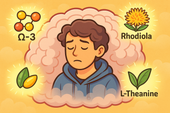
Brain Fog and Body Dysmorphic Disorder: Can Nootropic Supplements Help?
Brain fog often accompanies Body Dysmorphic Disorder, clouding focus and deepening emotional fatigue. Nootropic supplements like L-theanine, Rhodiola, and CoQ10 can help restore mental clarity, balance neurotransmitters, and bring calm energy back to the mind 🌿🧠.
-

How Stress Hormones Like Cortisol May Worsen Body Dysmorphic Disorder
Chronic stress floods the brain with cortisol — the hormone that keeps you on high alert. In Body Dysmorphic Disorder, this chemical overdrive fuels anxiety, distorts self-image, and traps the body in survival mode. Calming cortisol helps restore both peace and perspective 🌿🧠.
-

The Role of Neurotransmitters in BDD—and How Supplements May Help
Neurotransmitters like serotonin, dopamine, glutamate, and GABA shape how people with Body Dysmorphic Disorder perceive themselves. When these brain messengers fall out of balance, perception distorts — but targeted supplements can help restore calm, focus, and emotional regulation 🧠🌿.
-

What Is Body Dysmorphic Disorder? A Deeper Look at the Mind-Body Connection
Body Dysmorphic Disorder (BDD) isn’t just about appearance — it’s about perception. When brain chemistry, trauma, and stress distort self-image, the mind begins to see flaws that aren’t truly there. Healing starts by calming the nervous system and reconnecting mind and body 🪞🧠.
-

Keeping Calm in Competitive Sports: How to Train Your Mind, Body, and Chemistry for Peak Performance
Competitive pressure can overwhelm even the strongest athletes — but calm is trainable. By combining supplements like magnesium, L-theanine, and adaptogens with breathwork and mindset training, you can stay focused, balanced, and in control under any level of stress 🧠🏅.
-

Supplements for Parents Facing Toddler Tantrums: Staying Calm When Little Emotions Run Wild
Toddler tantrums can drain even the most loving parent — but your calm is powerful. With the right supplements like magnesium, L-theanine, and ashwagandha supporting your nervous system, you can stay patient, grounded, and kind, even when emotions run high 🧸🌿.
-

Workplace Stress and Anger Management Support
Workplace stress can quickly turn into frustration — but calm is a skill you can train. By combining supplements like magnesium, L-theanine, and adaptogens with breathwork and mindset tools, you can stay focused, patient, and emotionally grounded no matter how intense the office gets 💼🌿.
-

How to Stay Patient With Family During Stressful Holidays
Holiday gatherings can stir up old stress and test your patience — but calm is possible. With nervous system support from magnesium, L-theanine, and adaptogens, plus mindful breathing and clear boundaries, you can stay centered, kind, and grounded even when family chaos unfolds 🎄💞.
-

Supplements to Keep Calm During Traffic Jams
Getting stuck in traffic doesn’t have to ruin your mood. With calming supplements like magnesium, L-theanine, and ashwagandha, you can train your body to stay relaxed and focused behind the wheel — turning gridlock into a moment of grounded patience 🚗🌿.
-
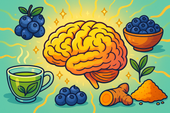
The Role of Antioxidants in Healing Brain Stress from Dissociation
Antioxidants protect the brain from the oxidative stress caused by trauma and dissociation. By neutralizing free radicals and supporting mitochondrial recovery, they help restore clarity, focus, and emotional balance — allowing the mind to heal at the cellular level 🌿🧠.
-
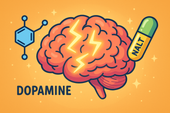
N-Acetyl L-Tyrosine (NALT) for Supporting Mental Clarity
N-Acetyl L-Tyrosine (NALT) fuels dopamine production — the neurotransmitter of focus and motivation. By supporting brain chemistry during stress, NALT helps restore mental clarity, energy, and alertness, making it easier to think clearly and feel present again ⚡🧠.
-

How Ginseng May Improve Focus and Energy in Dissociation
Ginseng helps combat the mental fatigue and fog that often come with dissociation. By supporting mitochondrial energy, balancing neurotransmitters, and regulating cortisol, it gently restores focus, motivation, and emotional presence — helping the mind reconnect with clarity and strength 🌿⚡.
-
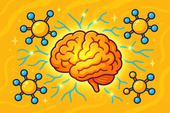
Phosphatidylserine and Dissociation: Supporting Cognitive Function
Phosphatidylserine helps calm the stress response by balancing cortisol, the body’s primary stress hormone. By lowering cortisol spikes, it protects memory, focus, and emotional stability — restoring clarity and mental presence for those struggling with dissociation 🧠🌿.
-
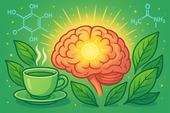
Can Green Tea Extract Help with Dissociative Brain Fog?
Green tea extract may help lift dissociative brain fog by supporting neurotransmitter balance, reducing inflammation, and enhancing energy at the cellular level. With its key compounds EGCG and L-theanine, it promotes calm focus, clarity, and emotional presence — helping you feel more alert and grounded 🍵🧠.
-
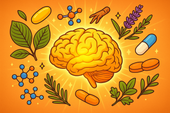
Building a Natural Supplement Stack for Dissociation Support
Building a supplement stack for dissociation means nourishing the brain and body back into communication. By supporting neurotransmitters, gut health, and energy balance through nutrients like magnesium, omega-3s, curcumin, and probiotics, you can help restore clarity, calm, and connection — one layer at a time 🌿🧠.
-

Chamomile and Lavender for Dissociative Anxiety Relief
Chamomile and lavender work together to calm dissociative anxiety by soothing the nervous system and restoring emotional safety. Their natural compounds balance cortisol, enhance GABA activity, and activate the vagus nerve — helping you feel grounded, connected, and at peace again 🌿💜.
-
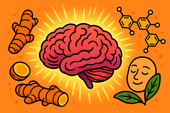
Curcumin for Inflammation and Mental Clarity in Dissociation
Curcumin, the golden compound in turmeric, does more than fight inflammation — it helps clear the mental fog often tied to dissociation. By calming neuroinflammation, balancing neurotransmitters, and supporting mitochondrial energy, curcumin can restore mental clarity, focus, and emotional presence 🌿🧠.
-
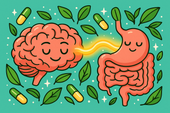
Probiotics and Dissociation: Exploring the Gut–Brain Axis
The gut–brain axis plays a vital role in emotional awareness and presence. When the microbiome is balanced, it supports serotonin production, vagus nerve activity, and calm focus. Probiotics help repair this connection — restoring safety, clarity, and the feeling of truly being in your body again 🌿🧠.
-
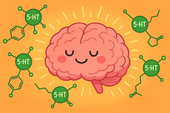
5-HTP for Dissociation: Supporting Serotonin and Emotional Stability
5-HTP helps bridge the gap between emotional numbness and stability by supporting serotonin production — the neurotransmitter that shapes mood, sleep, and sensory awareness. For people experiencing dissociation, 5-HTP may gently restore connection, presence, and emotional balance from the inside out 🌿🧠.


















































